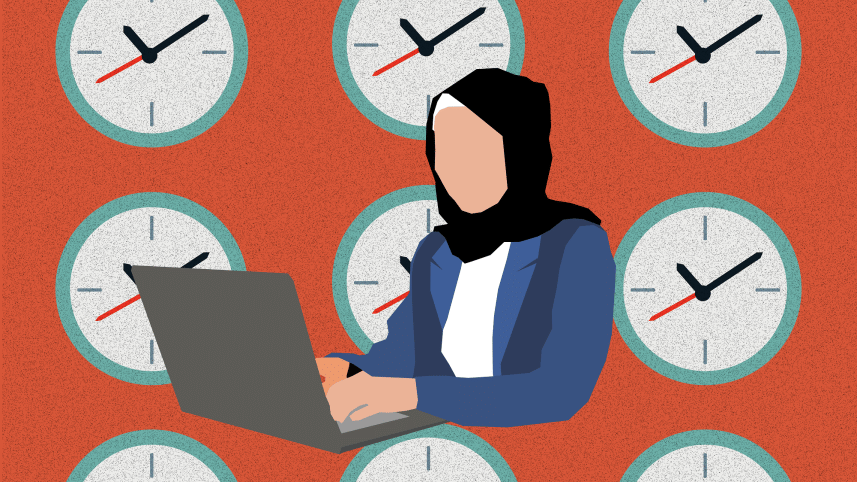How to stay productive at work while fasting

Fasting during Ramadan for spiritual reasons is a deeply rewarding experience, but it can also be challenging when balancing a full day of work. Between low energy, dehydration, and an unpredictable sleep schedule, staying focused and productive can feel like an uphill battle. However, with some smart strategies, you can manage your workload effectively without burning out.
One of the best ways to maintain productivity while fasting is to plan your workday around your energy levels. Right after Sehri, the morning time is when you are likely to feel the most refreshed and alert. This is the ideal time to tackle the most important and mentally demanding tasks. As the day progresses and fatigue starts setting in, save routine or easier tasks for the afternoon.
Using a planner or a to-do list can help you stay on track without overwhelming yourself. Working smarter, not harder, is key during this time. Focusing on priority tasks first helps avoid last-minute stress, and breaking big projects into smaller, manageable steps can make them feel less daunting. Whenever possible, automating repetitive tasks or delegating work to others can lighten your workload and prevent exhaustion.
Leveraging technology can also make a huge difference in managing your energy throughout the day. Productivity tools like Notion, Asana, or Google Calendar can help keep your tasks organised, while automation apps like Zapier or Microsoft Power Automate can handle repetitive work for you. AI-powered assistants like ChatGPT can be useful for quick research, drafting emails, or summarising information efficiently. Additionally, opting for video calls instead of in-person meetings can help conserve energy.
"By planning meals wisely, staying active, and optimising sleep, professionals can maintain their focus and efficiency even while fasting," says Farhana Preeti, AVP of Business Development at Shajgoj Limited. According to her, a well-balanced Sehri, rich in protein, fibre, and complex carbohydrates, provides sustained energy, while proper hydration between Iftar and Sehri is essential for overall well-being. She also advises against consuming sugary or fried foods, as they can lead to sluggishness and reduced focus.
Taking breaks and allowing yourself to recharge is just as important as managing your workload. Short breaks can be used to stretch, take a quick walk, or practice breathing exercises. The Pomodoro technique—working for 25 minutes and then taking a 5-minute break—can help maintain productivity while preventing burnout. If your workplace allows, a quick power nap of 15-20 minutes can be incredibly refreshing.
Optimising your workspace and using smart productivity hacks can further enhance focus. Keeping your desk clutter-free minimises distractions, while apps like Forest or Brain.fm can create an environment conducive to concentration. Pre-written email templates can save time on routine communications, allowing you to work more efficiently.
Ayman Sadiq, CEO of 10 Minute School, shared his tips for staying productive during Ramadan: "Adjust your desk and chair height for better posture and position your laptop and mouse ergonomically to avoid strain. And most importantly, no multitasking—focus on deep work to maximise efficiency."
Handling meetings and communication wisely is another crucial aspect of maintaining productivity while fasting. Important meetings should be scheduled in the morning when your energy and concentration levels are higher. Keeping emails and discussions brief helps conserve energy, and using voice notes instead of long text messages can be a time-saver. Collaboration tools like Slack, Trello, or Microsoft Teams streamline communication, making work more manageable.
Staying positive and motivated throughout the fasting period can make a significant difference. Reminding yourself of the spiritual purpose behind fasting helps reinforce discipline and patience. Practising gratitude can improve your mindset, and celebrating small wins—like completing tasks on time despite fasting— will keep you motivated.
For those dealing with traffic jams during their commute, planning ahead can reduce stress. If remote work or flexible hours are an option, they can help avoid unnecessary travel fatigue. Keeping water and light snacks handy in case you're stuck in traffic at Iftar time is a practical solution, and using navigation apps to plan your route can help you avoid heavily congested areas.
Many professionals who fast say that adjusting their sleep schedule is key to staying productive. Some prefer handling complex tasks in the morning and leaving creative work for the evening when they feel more relaxed. Health experts also recommend light physical activity, such as short walks, to keep blood circulation going. Experienced professionals advise setting realistic daily goals and avoiding an overloaded schedule—fasting is a time for balance, not burnout.
At the end of the day, fasting and work can go hand in hand with the right approach. By staying organised, working smart, and taking care of your health, you can navigate your workday efficiently without feeling overwhelmed. The key is to pace yourself, stay mindful of your energy levels, and remember that you don't have to do everything simultaneously. Work smart, not hard, and you'll end your day feeling accomplished.
 For all latest news, follow The Daily Star's Google News channel.
For all latest news, follow The Daily Star's Google News channel.
Comments